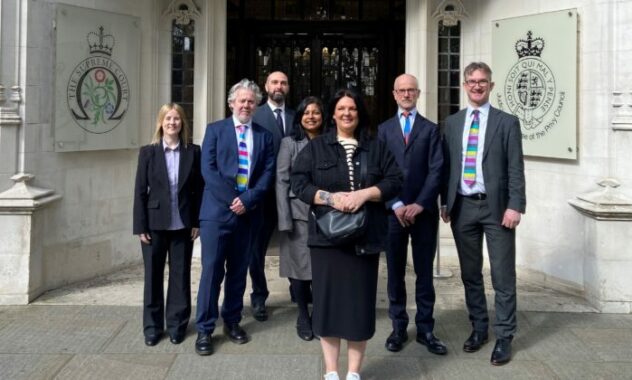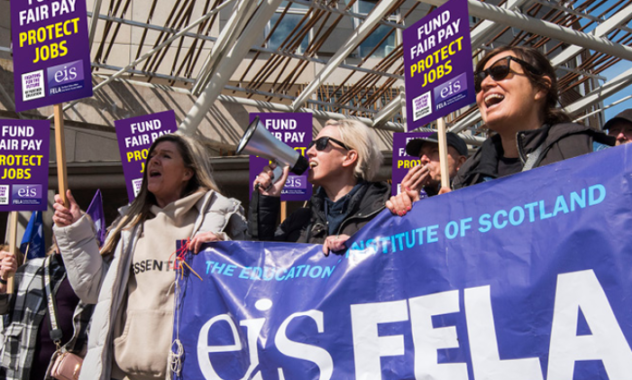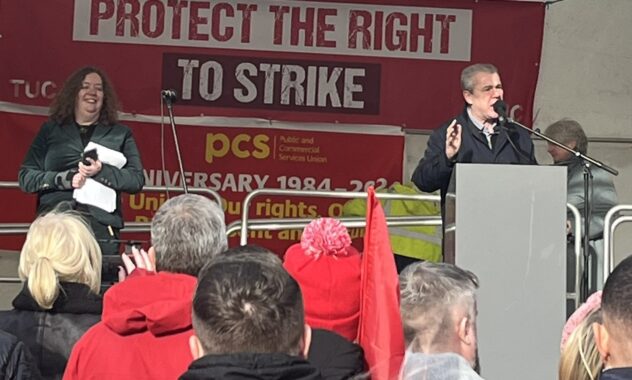What’s wrong with the Police, Crime, Sentencing and Courts Bill
A brief IER guide to the dangers to democracy posed by the Police, Crime, Sentencing and Crime Bill currently passing through Parliament.

The Police, Crime, Sentencing and Courts Bill had its second reading in the House of Commons on Monday and Tuesday (15-16 March 2021) where it was voted through by 359 Conservative MPs. Opposition parties unanimously voted against the government, while the DUP – traditional allies of the Tories – abstained.
MPs called the Bill a “trojan horse”, holding within its nearly 300 pages of draft legislation a mixture of uncontentious measures and extremely controversial ones. The most damaging sections for the trade union movement fall within Part 3, which one MP said “would make a dictator blush” in its severe curtailing of the right to protest.
To set the scene, a particularly powerful speech from Labour Party MP, Clive Lewis, in the House of Commons on Tuesday (16 March 2021):
How often have we heard the notion that somehow liberty is an integral part of the English character, and that we fortunate few in this country are somehow different from the rest of humanity? Not for us authoritarianism, autocracy or, God forbid, the dark slide into fascism. No, no, no—that is for other people and other countries, not us. Yet here we stand, yet again with yet another Bill from this Government stripping the people of this country of yet more liberty and more of their democratic rights.
English exceptionalism is a dangerous fallacy, none more so than when it comes to the constant vigilance required of any democracy. It is hubris of the first order—one I fear has infected those on the Government Benches. The potential for the slide into authoritarianism and worse is, as history has clearly demonstrated, part of the human condition. That is the painful and bloody lesson from the 20th century. Yet here we are, with this Bill before us. It is the tip of an authoritarian iceberg—one that is on a collision course with public defiance.
What does it say?
The Bill is lengthy and covers a great range of issues, from strengthening the prevention and prosecution of child sexual offences, to taking a more hard-line approach to dangerous driving, and new provisions on the sentencing, release and probation of criminals.
Many of the government’s policies on these issues found broad support in Parliament but such was the outrage at new laws to criminalise “noisy” protests and prosecute people in the Gypsy and Roma communities that no MP outside of the Conservative Party felt able to vote in favour of it. Even former Prime Minister – Theresa May – publicly denounced the plans to curtail the rights to freedom of assembly and to speech.
Below are detailed the sections of the 12-part Bill that most concern the labour movement.
Clause 2, Part 1: Protection of the police etc.
Clause 2 of Part 1 of the Bill increases the maximum sentence for assaulting an emergency worker from 12 months to two years. This measure found wide support across Parliament, but several MPs pointed out that emergency workers are not the only group suffering frequent violent attacks and the provision should be extended to all staff across the NHS and social care, as well as shop workers.
Research by Usdaw found that the vast majority (88%) of shop workers were victim to verbal abuse in 2020, largely because customers were unhappy about following Covid-19 restrictions. Nearly two-thirds (60%) were threatened, and nearly one in ten (9%) were assaulted.
Clauses 54-60, Part 3: Public order
Clauses 54-60 in Part 3 of the Bill effectively criminalise protests that cause disruption – defined in broad and vague terms – even in the case of one-person protests.
Criminalising noise
Clauses 54-56 and 60 allow police to place conditions on protests as a response to “the noise generated by persons taking part” as well as to impose penalties on those breaching such conditions if they “ought to have known” they were in place. As Shadow Home Secretary, Nick Thomas-Symonds, told Parliament: “That would have the effect of criminalising people who unwittingly breach conditions”.
Importantly, existing laws already place conditions on protests when they cause danger – for example, if an ambulance is not able to pass. The new provisions tighten police control much further.
Ten-year sentences for being annoying
As well as amending the Public Order Act 1986 to tighten police control of protests, this section also introduces a new statutory offence of “intentionally or recklessly causing public nuisance”.
People found guilty of this new offence, which includes causing “serious annoyance” or “serious inconvenience” – or even just causing the risk that said annoyance and inconvenience will take place – are liable to be imprisoned for up to ten years if convicted on indictment or 12 months if convicted summarily.
Elsewhere in the Bill, similarly high sentences are imposed on those causing damage to statues and memorials, presumably as a response to the toppling of slave trader Edward Colston’s statue by Black Lives Matter protestors in Bristol. Under the proposed law, said protestors could be looking at ten years in prison. This – as many opposition MPs pointed out during the debate – is a longer sentence than that given for violent crimes against living people. Indeed, it is twice the length of the maximum sentence for assault causing actual bodily harm (five years).
As Labour MP, Peter Kyle, pointed out on Monday, an “angry mob” that throws a statue in a Bristol harbour “and then turns around and throws a woman or a child into water” would be penalised more harshly for the first offence than for the second.
“No Government should ever send out a signal that the safety of a statue carries greater importance in our laws than the safety of women,” Nick Thomas-Symonds said, adding that “this Bill has now been extended to every form of memorial, including statues of slave traders.”
Keeping protests out of sight of those in power
"My office looks over Parliament Square. I have long complained about the endless demonstrations that take place … It is very difficult to work because of the noise—the drums, horns and loudspeakers … our work should not be disrupted."
Clauses 57 and 58 widen the “controlled area” around Parliament, within which protests may not take place, to such an extent that many MPs pointed out those in power would be able to go about their day without hearing or seeing public opposition to their actions.
“We will not hear them because we are putting in an exclusion zone around Parliament so far-reaching that what they have to say—their legitimate protest—will not fall on deaf ears; they will simply be so far away that it will not be audible. They will effectively be silenced. I want those people to know that I do not want them silenced, even if they are opposed to what I stand for. I want to be a Member of a Parliament that embraces democracy; the Bill is doing the opposite, and it is embarrassing.”
Ann McLaughlin, SNP MP
Other problems with the Bill
Motivation
It is not difficult to make the link between the contents of this Bill and recent protests by the Black Lives Matter movement and climate change activists, Extinction Rebellion. As many in Parliament pointed out, both of these movements were greeted with considerable disdain by Home Secretary, Priti Patel, who introduced this Bill. She has variously described these protestors as “dreadful”, “thugs”, “hooligans” and “criminals”.
Why such a rush?
The Home Secretary has also been accused of trying to stifle scrutiny of such an expansive bill by rushing it through Parliament. The nearly 300 pages of legislation was published just one week before it was debated in the House of Commons.
Human rights violations
Many MPs during the debate highlighted potential contraventions of the Bill with international human rights laws, chiefly Article 11 of the European Convention on Human Rights – the right to freedom of assembly and association.







